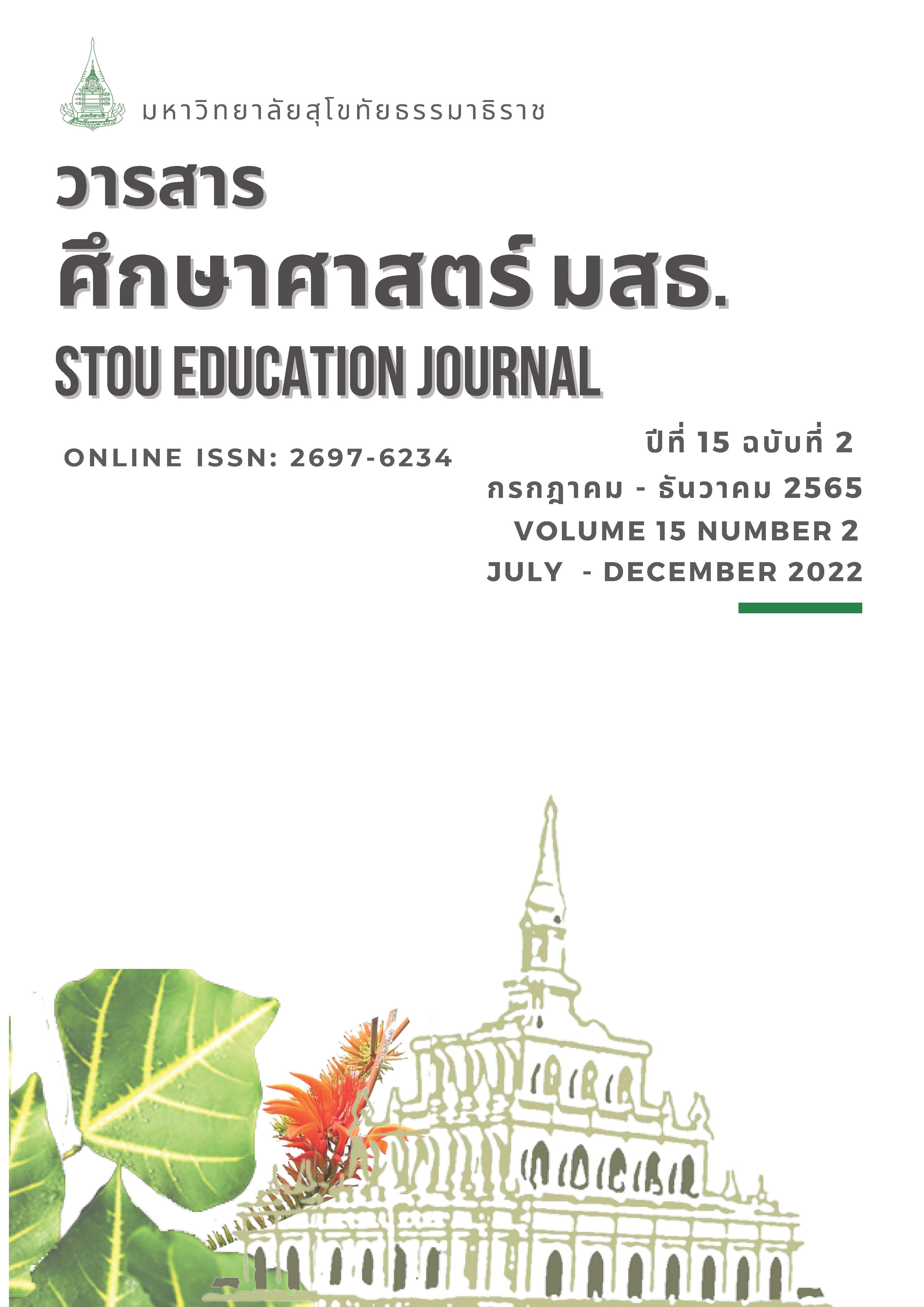Relationship Between Social Well-being and Mental Health Problems of Older Adults During the COVID-19 Pandemic
Main Article Content
Abstract
This study aimed to examine 1) mental health problems of older adults during the COVID-19 pandemic; and 2) the relationship between social well-being and mental health problems of older adults during the COVID-19 pandemic. Participants were 305 older adults, obtained by using a convenience sampling technique. Research instruments included questions to ask older adults to self-report about the impact of COVID-19; and 2) social well-being, stress, anxiety, and depression scales, each with a reliability coefficient of .72, .81, .77, and .85 respectively. Hierarchical regression analysis was performed to analyze the data. The findings revealed that 1) older adults had mental health problems, including stress, anxiety, and depression at levels higher than normal; and 2) social well-being was correlated with mental health problems of older adults as follows: (1) Independent variables consisting of gender, age, and the impact of COVID-19 predicted mental health problems, particularly depression, in older adults at the .01 level of statistical significance. (2) Age, gender, the impact of COVID-19, and social well-being predicted stress and depression at a statistically significant level of .01, and anxiety at a statistically significant level of .05. Older adults who reported themselves as highly affected by COVID-19 were at a high risk of depression. Moreover, those with low social well-being were at higher risk of stress, anxiety, and depression.
Article Details
References
ชลธิชา อัศวนิรันดร และ วิราภรณ์ โพธิศิริ. (2558). การแลกเปลี่ยนการเกื้อหนุนระหว่างผู้สูงอายุกับบุตร ในประเทศไทย: สถานการณ์แนวโน้มและความแตกต่างทางเพศและอายุ. วารสารสังคมศาสตร์และ มนุษยศาสตร์, 41(1), 105-120.
สำนักงานสถิติแห่งชาติ. (2561). รายงานการสำรวจประชากรสูงอายุในประเทศไทย พ.ศ.2560. สำนักงานสถิติแห่งชาติ กระทรวงดิจิทัลเพื่อเศรษฐกิจและสังคม.
อรัญญา ตุ้ยคำภีร์, พรรณระพี สุทธิวรรณ, เรวดี วัฒฑกโกศล, สมโภชน์ เอี่ยมสุภาษิต, นิปัทม์ พิชญโยธิน, สักกพัฒน์ งามเอก, พนิตา เสือวรรณศรี, และ หยกฟ้า อิศรานนท์. (2563). โครงการการสูงวัยอย่างมีความสุขและสุขภาวะของผู้สูงอายุในชุมชนเมืองน่าอยู่เพื่อผู้สูงอายุ: การศึกษาแนวพัฒนาการชีวิต (มิติการสนับสนุนของชุมชนและการบริการด้านสุขภาพ) ภายใต้โครงการบูรณาการสหศาสตร์เพื่อรองรับสังคมสูงวัย (จุฬาอารี) ของจุฬาลงกรณ์มหาวิทยาลัย ในปี พ.ศ. 2562-2563. เอกสารอัดสำเนา. จุฬาลงกรณ์มหาวิทยาลัย.
อรัญญา ตุ้ยคำภีร์, พรรณระพี สุทธิวรรณ, สมโภชน์ เอี่ยมสุภาษิต, เรวดี วัฒฑกโกศล, จุฑาทิพย์ วิวัฒนาพันธุวงศ์, วรัญญู กองชัยมงคล, พูลทรัพย์ อารีกิจ, และ อาภาพร อุษณรัศมี. (2564). การลดผลกระทบทางจิตใจจากสถานการณ์การแพร่ระบาดของโรคโควิด-19 ในนิสิตและบุคลากรจุฬาลงกรณ์มหาวิทยาลัย. เอกสารอัดสำเนา. จุฬาลงกรณ์มหาวิทยาลัย.
Arora, T., Grey, I., Östlundh, L., Lam, K.B.H., Omar, O.M., & Arnone, D. (2020). The prevalence of psychological consequences of COVID-19: A systematic review and meta-analysis of observational studies. Journal of Health Psychology, 27(4), 805-824. 29:1359105320966639. https://doi.org/10.1177/1359105320966639
Bustamante, G., Guzman, V., Kobayashi, L.C, & Finlay, J. (2022). Mental health and well-being in times of COVID-19: A mixed-methods study of the role of neighborhood parks, outdoor spaces, and nature among US older adults. Health & Place, 76, 102813. https://doi.org/10.1016/j.healthplace.2022.102813.
Hamza, C. A., Ewing, L., Heath, N. L., & Goldstein, A. L. (2021). When social isolation is nothing new: A longitudinal study psychological distress during COVID-19 among university students with and without preexisting mental health concerns. Canadian Psychology, 62(1), 20. https://doi.org/ 10.1037/cap0000255
Husky, M. M., Kovess-Masfety, V., & Swendsen, J. D. (2020). Stress and anxiety among university students in France during Covid-19 mandatory confinement. Comprehensive psychiatry, 102, 152191. https://doi.org/10.1016/j.comppsych.2020.152191
Keyes, C. L. (1998). Social well-being. Social Psychology Quarterly, 61(2), 121–140.
Keyes, C. L. (2013). Promoting and protecting positive mental health: Early and often throughout the lifespan. In Mental well-being. Springer.
Larson, J. S. (1993). The measurement of social well-being. Social Indicators Research, 28(3), 285–296. https://doi.org/10.1007/BF01079022
Lim, L. L., & Kua, E. H. (2011). Living alone, loneliness, and psychological well-being of older persons in Singapore. Current gerontology and geriatrics research, 2011.
Lovibond, P. F., & Lovibond, S. H. (1995). The structure of negative emotional states: Comparison of the Depression Anxiety Stress Scales (DASS) with the Beck Depression and Anxiety Inventories. Behaviour Research and Therapy, 33(3), 335-343.
Mao, X., & Han, WJ. (2018). Living arrangements and older adults' psychological well-being and life satisfaction in China: Does social support matter? Family Relations, 4, 567-584. https://doi.org/10.1111/fare.12326.
Paulino, M., Dumas-Diniz, R., Brissos, S., Brites, R., Alho, L., Simões, M. R., & Silva, C. F. (2021). COVID-19 in Portugal: Exploring the immediate psychological impact on the general population. Psychology, Health & Medicine, 26(1), 44–55. https://doi.org/10.1080/13548506.2020.1808236
Rowe, J. W., & Kahn, R.L. (1987). Human aging: Usual and successful. Science, 237, 143-149.
Rowe, J. W., & Kahn, R. L. (1997). Successful aging. The gerontologist, 37(4), 433-440.
Rowe, J. W., & Kahn, R.L. (1998). Successful aging. Pantheon.
Sun, X., Lucas, H., Meng, Q., & Zhang, Y. (2011). Associations between living arrangements and health-related quality of life of urban elderly people: A study from China. Quality of Life Research, 20(3), 359-369.
Tabachnick, B. G., & Fidell, L. S. (2019). Using Multivariate Statistics (7th ed.). Pearson.
World Health Organization. (2003). The World health report 2003: Shaping the future. https://apps.who.int/iris/handle/10665/42789
World Health Organization. (2020). Coronavirus disease 2019 (COVID-19): Situation report-38. www.who.int/docs/default-source/coronaviruse/situation-reports/20200227-sitrep-38-covid-19.pdf?sfvrsn=9f98940c_2
Zaninotto, P., Iob, E., Demakakos, P., & Steptoe, A. (2022). Immediate and longer-term changes in the mental health and well-being of older adults in England during the COVID-19 pandemic. JAMA Psychiatry, 9(2):151–159. https://doi.org/10.1001/jamapsychiatry.2021.3749


